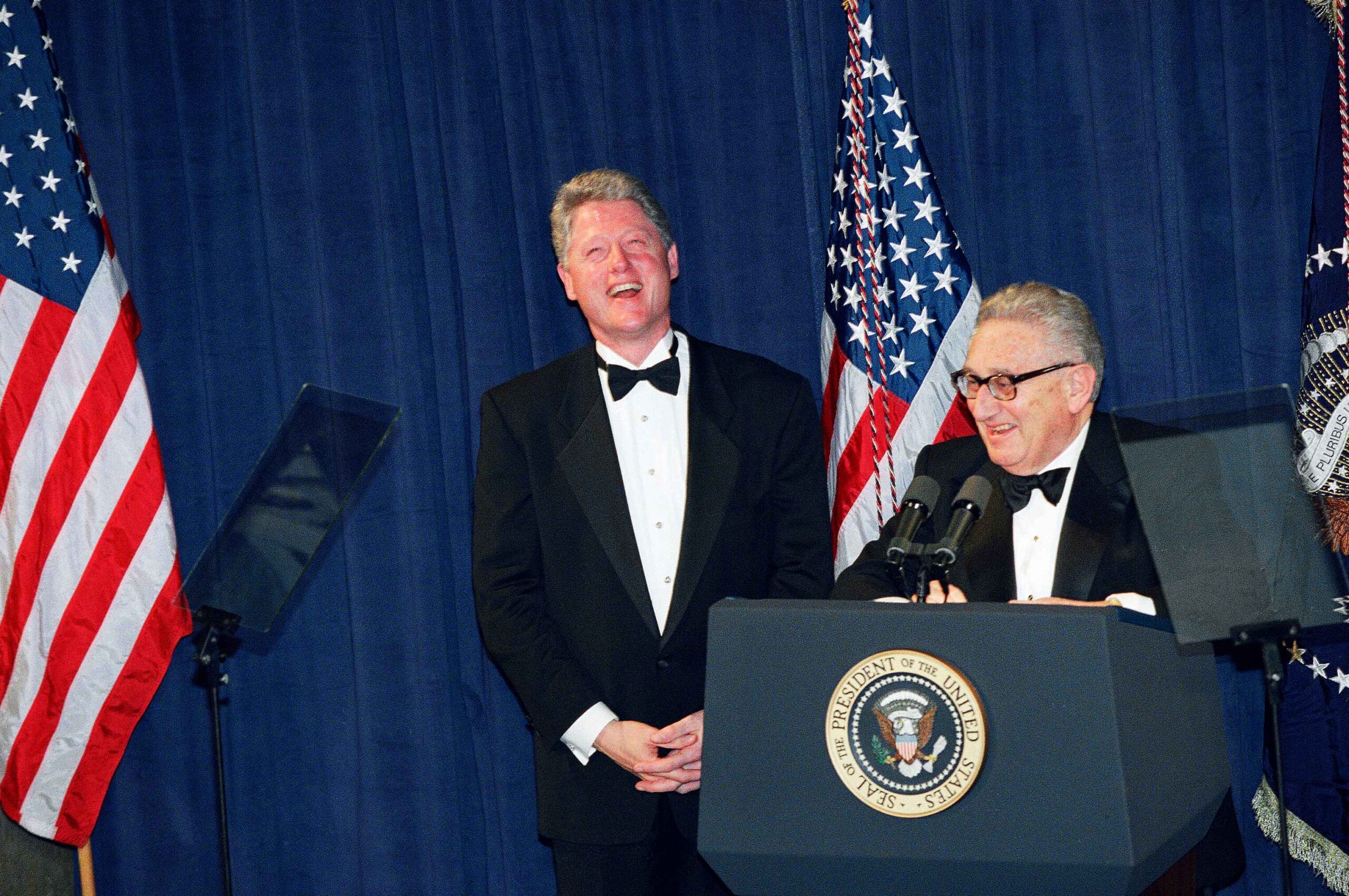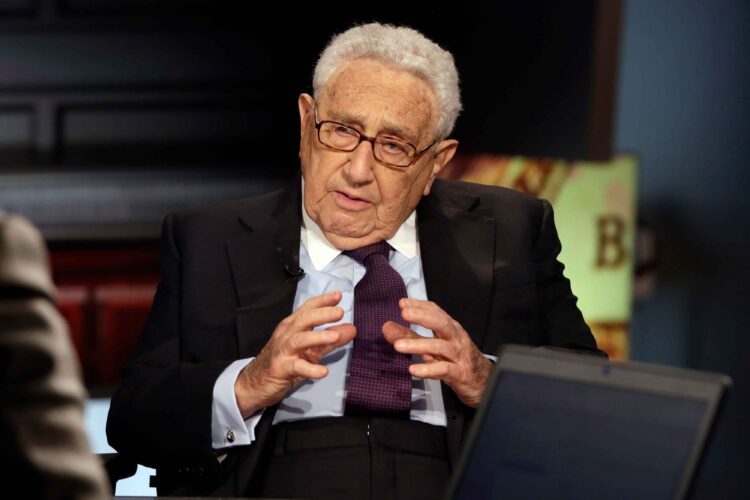Former Secretary of State Henry Kissinger died on the night of Wednesday, Nov. 29th at 100 years of age. He will be remembered as one of the most legendary statesmen and notorious warmakers of the twentieth century.
Born in Germany to Jewish parents, Henry Kissinger’s family immigrated to the United States in 1938 following the rise of political antisemitism in his native country. Henry became a naturalized citizen and joined the US Army in WWII, serving as a German interpreter. He went on to obtain a PhD at Harvard and worked there for a number of years as a professor, becoming the Associate Director of the Department of Government and Center for International Affairs in 1957.
Learn the benefits of becoming a Valuetainment Member and subscribe today!
Then began Kissinger’s formal political career. He worked as a consultant for various government agencies specializing in foreign policy, including the National Security Council, the State Department, and the Arms Control and Disarmament Agency. In 1968, President Richard Nixon picked Kissinger to be his National Security Adviser, and then broke precedent by appointing him to serve as Secretary of State while letting him retain his former role. Kissinger remained in both jobs after Nixon was replaced with President Gerald Ford following the Watergate scandal. He played a significant role in the opening of China to the world market and in the Yom Kippur War.
While a highly controversial figure, Kissinger remained an important outside advisor to every presidential administration since (with the humorous exception of Biden, who said he knows as much as Kissinger on foreign policy). He leaves behind his wife of 50 years, his two children, and five grandchildren.
For readers too young to remember him and what he stood for, we have collected some of his top quotes to show the best and worst of this polarizing individual.
1) “The illegal we do immediately, the unconstitutional takes a little longer.”
Kissinger employed this statement many times amid the fallout from the Watergate scandal, when Richard Nixon was caught spying on his political opponents. As one journalist put it, Kissinger liked to agree to accusations with blunt statements of agreement in order to make reporters laugh, disarming them with his wit and charm.
2) “Military men are dumb, stupid animals to be used as pawns for foreign policy.”
Kissinger allegedly said this to General Alexander Haig, Nixon’s Chief of Staff (and later Ford’s) according to Bob Woodward’s and Carl Bernstein’s 1976 book The Final Days: The Classic, Behind-the-Scenes Account of Richard Nixon’s Dramatic Last Days in the White House.

3) “Power is the ultimate aphrodisiac.”
Kissinger offered this as an explanation as to why he was voted “the man I would most like to go out on a date with” in a poll of Playboy Club Bunnies in 1972. Kissinger was a notorious womanizer in the 1970s, regularly getting paired with Hollywood starlets by show business executives. Nicknamed “Super K” at the time, books from the period like Kissinger: The Adventures of Super-Kraut as well as biographies written later like Walter Isaacson’s 1992 Kissinger retell the escapades this homely PhD had with the fair sex.
4) “I don’t see why we need to stand by and watch a country go communist due to the irresponsibility of its people. […] The issues are much too important for the Chilean voters to be left to decide for themselves.”
Kissinger was the chairman of the CIA-backed effort to overthrow the new Chilean government of Marxist Salvador Allende. Allende wanted to ally the country with Cuba and nationalize American companies located in the country. General Augusto Pinochet led a coup and formed a capitalist dictatorship, and many soldiers under his command turned out to be on CIA payroll.
Kissinger was pursued by international human rights criminal courts for many years after he stepped down from these government positions. Which leads us to:
5) “It is an act of insanity and national humiliation to have a law prohibiting the President from ordering assassination.”
Kissinger allegedly said this at a National Security Council meeting in 1975. It is not exactly a mystery as to who Kissinger had in mind for advisor in this role.

6) “[Nixon] wants a massive bombing campaign in Cambodia. He doesn’t want to hear anything. It’s an order, to be done. Anything that flies or anything that moves. You got that?”
Kissinger said this on a Dec. 1970 phone call with Haig. Kissinger’s relentless and illegal (done without congressional approval) bombing of Cambodia is considered one of the worst war crimes he committed in the eyes of humanitarian critics. What made the matter even more indefensible in their eyes is the fact that its justification—deposing the influence of the communist Viet Cong—led to the rise of the bloodthirsty Khmer Rouge regime led by Pol Pot. Despite Pol Pot being a murderous dictator, Kissinger later found it advantageous to make a deal with the Khmer Rouge, allowing them to continue their killing:
7) “How many people did [Khmer Rouge Foreign Minister Ieng Sary] kill? Tens of thousands? You should tell the Cambodians (i.e., Khmer Rouge) that we will be friends with them. They are murderous thugs, but we won’t let that stand in the way. We are prepared to improve relations with them.”
Kissinger said this during a Nov. 26, 1975 meeting with a Thai foreign minister, according to a State Department record.
8) “The emigration of Jews from the Soviet Union is not an objective of American foreign policy. […] And if they put Jews into gas chambers in the Soviet Union, it is not an American concern. Maybe a humanitarian concern.”
This remark, which was recorded on Nixon’s White House tapes, reflects Kissinger’s commitment to the cold-hearted doctrine of Realpolitik, or Realism in foreign policy. Rather than push FDR-style democracy abroad in Deweyite-Wilsonian fashion, or pursue a Jacobin-like crusade against theocratic regimes like Bush Neoconservatives, Realists like Kissinger believed in pragmatically pursuing peace through a diplomatic balancing of powers, even if it meant ignoring atrocities abroad.
9) “A country that demands moral perfection in its foreign policy will achieve neither perfection nor security.”
This is the most authenticated quote in this list, as it was written by Kissinger himself in the pages of Foreign Affairs magazine. Again, for Kissinger stone-cold “realism” triumphed over moral idealism in matters of geopolitics—and in personal life. What was most important for Kissinger was national security and international peace, even at the expense of rights, privacy, and countless lives.

10) “It was a grave mistake to let in so many people of totally different culture and religion and concepts, because it creates a pressure group inside each country that does that.”
Kissinger made this comment just last month in light of the vast protests across the Western world in favor of Palestine and Hamas. This marked a surprising turn in the beliefs of a man who was instrumental in the globalization process that occurred since WWII.
When news of Kissinger’s death broke, social media users came out in droves with varied reactions, reflecting the wide spectrum of opinion on the actions of this man:
A great one has passed. Fortunate indeed is America for his lifetime of diplomacy, wisdom, and love of freedom. https://t.co/2n5hK51KHU
— Mitt Romney (@MittRomney) November 30, 2023
Henry Kissinger was a titan among America’s most consequential statesmen. His ideas, his diplomatic skill, and his sheer force of will in service to our country changed the course of history. My thoughts and prayers are with the Kissinger family.
— Leader McConnell (@LeaderMcConnell) November 30, 2023
Henry Kissinger's strategy and excellence in diplomacy has shaped global politics throughout the 20th century.
His influence and legacy will continue to reverberate well into the 21st century.
— Ursula von der Leyen (@vonderleyen) November 30, 2023
DAVID ROCKEFELLER AND KLAUS SCHWAB ON HENRY KISSINGER
Native on "X" for those blocked from viewing bitchute. pic.twitter.com/51Yu8dhHly
— Robert W Malone, MD (@RWMaloneMD) November 30, 2023
'The World Economic Forum wasn’t simply the brainchild of Klaus Schwab, but was actually born out of a CIA-funded Harvard program headed by Henry #Kissinger'
"My research indicates that the World Economic Forum is not a European creation. In reality, it is instead an operation… pic.twitter.com/fYjePh0J8l— Robin Monotti (@robinmonotti) November 30, 2023
▪️HENRY KISSINGER CRIMES
– Cambodia bombing: 500,000 killed.
– East Timor invasion support: 200,000 deaths.
– Chile government overthrow: Us backed Pinochet's dictatorship.
– Bangladesh killings: 3 million deaths.
– Argentina's 'Dirty War': 30,000 killed and 30,000… pic.twitter.com/VjhdMBGFLU
— Saba Shiferaw 🇪🇹(Abiy Ahmed Ali will lead ) (@Sabi92409431) November 30, 2023
Henry Kissinger dead at 100.
This is kind of a big deal… Timing is everything. Old or not.. This is what I'll be digging on today.
He spoke about a peaceful world order while meeting publicly with Trump. (See part 2)
Foreign born [war monger] to some. pic.twitter.com/XTUuYD05MY
— Joe Rambo (@BrainStorm_Joe) November 30, 2023
"He’s a thug, and a crook, and a liar, and a pseudo-intellectual and a murderer. All those things are factually verifiable. That he’s an anti-communist is a speculation that he likes to encourage.”⁰— Christopher Hitchens on Henry Kissinger (in conversation with Allan Gregg) pic.twitter.com/TLD68BDXf1
— 𝚙𝚘𝚕𝚢𝚝𝚑𝚎𝚗𝚎 𝚜𝚙𝚊𝚖 (@BettyLies) November 30, 2023
The left will talk about Kissinger and Cambodia all day long but never mention the murderous Cambodian communists who slaughtered 1/4 of their own countrymen in the name of progress and equality
A lot of y’all have never seen The Killing Fields and it shows
— Jack Poso 🇺🇸 (@JackPosobiec) November 30, 2023
Former U.S. Secretary of State Henry Kissinger died at age 100, leaving behind a legacy of war crimes around the world. pic.twitter.com/CyF3yleIw1
— AJ+ (@ajplus) November 30, 2023


















Add comment